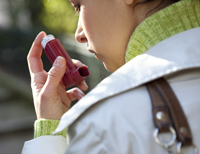|
 Controlling asthma during allergy season
Controlling asthma during allergy season
By Richard W. Pomerantz, MD, Novant Health Pulmonary and Critical Care
It is a beautiful time of year as the weather turns warmer and flowers and trees bloom. However, if you have asthma, you might not be as excited to see the change in weather. While asthma is a chronic condition, most people affected by it notice weather and seasonal variations that can make it challenging to control.
Before we discuss seasonal variations that can affect asthma, it is important to understand basic asthma therapy. All patients with asthma are prescribed “rescue” medications, such as albuterol inhalers, to use for increased symptoms. For very mild asthma, this type of medication might be the only kind needed. If a patient has more severe asthma, “controlling” medications like Singulair (a pill), Asmanex (or other types of inhaled steroids) and Xolair (a periodic injection) may be prescribed. Controlling medications are meant to be taken regularly, not just when symptoms are more severe.
Seasonal changes with asthma can be associated with allergies to different plants and pollens like trees (early spring), grasses (late spring) and weeds (late summer through early fall). It is important for patients with asthma to discuss with their doctors how they may be affected by changes in seasons. Asthma therapies should be personalized, but there are some general recommendations for minimizing the impact of seasonal variations:
 Don’t relocate in an attempt to minimize the impact of allergies on asthma – it generally will not help. Many allergens simply can not be avoided by moving, and how a patient reacts to different environments is unpredictable. Don’t relocate in an attempt to minimize the impact of allergies on asthma – it generally will not help. Many allergens simply can not be avoided by moving, and how a patient reacts to different environments is unpredictable.- Talk with a doctor to see if testing for allergies is an option. Testing may be appropriate for some asthma patients when allergies are strongly associated with asthma symptoms or when typical asthma therapy does not control symptoms.
- Using a higher dose or an additional controlling medication during certain times of the year might be effective for some patients.
- Take an antihistamine, such as Allegra or Claritin, to help control symptoms. These are often available over the counter.
- Ensure proper use of inhalers. It is important for all patients with asthma to know how to properly use an inhaler, especially since some newer devices can be complicated and require training.
- Stop smoking. It is always recommended to stop smoking, but it is critically important for patients with asthma to do so.
- Control sinus symptoms and sinus drip. During the spring and summer, controlling sinus symptoms is often important for controlling asthma. A simple over-the-counter saline nasal rinse is relatively inexpensive and can be very effective. Other therapies, like nasal steroids, can be used in conjunction with saline rinsing.
While all of these recommendations for controlling asthma during allergy season are helpful, it is important for patients to work with their provider to control symptoms and properly manage medications. Please remember, medication changes should only be done after consulting a physician.
To find a Novant Health provider, visit NovantHealth.org/doctor. |

